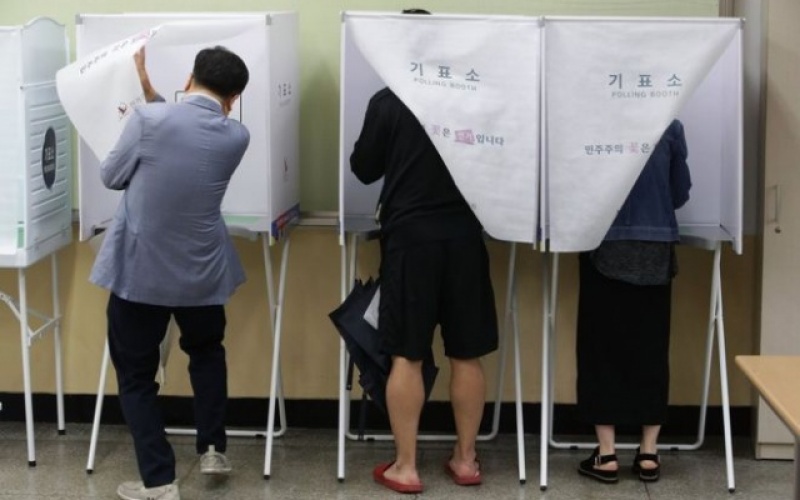
South Koreans are voting in a presidential election, called early after a huge corruption scandal brought down their former leader.
Liberal Moon Jae-in is the clear front-runner with centrist Ahn Cheol-soo his nearest challenger.
The election is being closely watched at a time of economic uncertainty and heightened tensions with North Korea.
Mr Moon wants to increase contact with the North in contrast to ex-leader Park Geun-hye who cut almost all ties.
Observers are expecting a high turnout at the ballot boxes, with numbers boosted by younger voters, as South Koreans choose from 13 candidates.
Polls close at 20:00 local time (11:00 GMT), with the winner expected to be announced soon after.
Money and jobs
All the candidates are promising to protect the fragile recovery in South Korea’s economy – the fourth largest in Asia – and to bring down youth unemployment, which remains stubbornly high.
There are also promises to rein in perceptions of elitism in South Korean political society and reform the family-run conglomerates – chaebols – which dominate the domestic economy.
Keeping an eye on the North
But heightened tensions on the Korean peninsula in recent weeks have also made the perennial concern of domestic security a key election concern.
Mr Moon, of the Democratic Party of Korea, has advocated greater dialogue with the North while maintaining pressure and sanctions.
He has been critical of the two previous conservative administrations for failing to stop North Korea’s weapons development.
Both he and Mr Ahn have urged US President Donald Trump to cool his rhetoric towards the North after his administration suggested it could take military action over Pyongyang’s weapons programme.
Conservative candidate Hong Joon-pyo of the Liberty Korea Party however has attacked Mr Moon’s approach, saying on Thursday morning that the election was a “war of regime choices”.
A North Korean endorsement: Stephen Evans, BBC News, Seoul
North Korea has dropped a pretty clear hint about who it wants to win the election.
A state media editorial says the current North and South relationship has been “been wrought by the conservative groups which, having been in power for the past 10 years, revived the foregone period of confrontation and maximized the political and military rivalry between the same race”.
This indicates it favours a candidate associated with what’s known as the Sunshine Policy when Pyongyang and Seoul communicated and co-operated.
The policy finally collapsed in 2008 after North Korea’s started testing nuclear devices, though it had faltered earlier when South Korea stopped sending aid to the north in 2006.
Moon Jae-in was part of the government which promoted the Sunshine Policy. He has indicated he wants closer ties with the North in this campaign. An endorsement by Pyongyang won’t help him win – but it probably won’t harm his chances very much either.
New blood at the top
Candidates are also promising a break from the past as symbolised by the deeply unpopular Ms Park.
Mr Moon, has called for an “overwhelming victory” as it would help to heal a national divide caused by her impeachment.
“I feel that not only my party and myself but also the people have been more desperate for a change of government,” he told reporters on Tuesday morning after he cast his vote.
In March, Park Geun-hye became the first South Korean president to be removed from power by impeachment.
She denies wrongdoing – although she has repeatedly apologised – and is standing trial on charges of bribery and abuse of power.
Mr Moon narrowly lost to Ms Park in the last presidential election in 2012.
Mr Ahn had also run for the job but dropped out to endorse Mr Moon in an attempt to consolidate votes against Ms Park. He has now positioned himself as an alternative to Mr Moon, promising to be tougher on national security.
“The time for Ahn Cheol-soo is here and the time for Moon Jae-in is slipping away,” he declared in his campaign.
Source: BBC

































